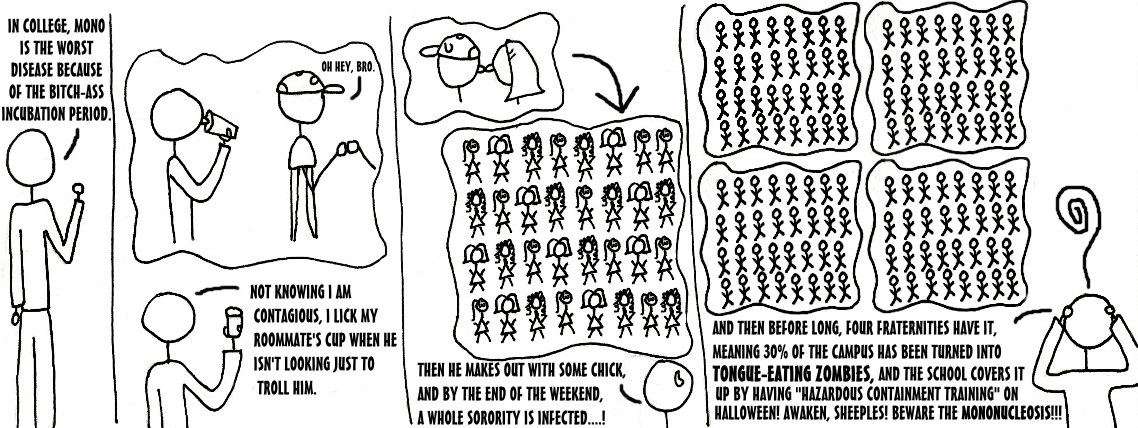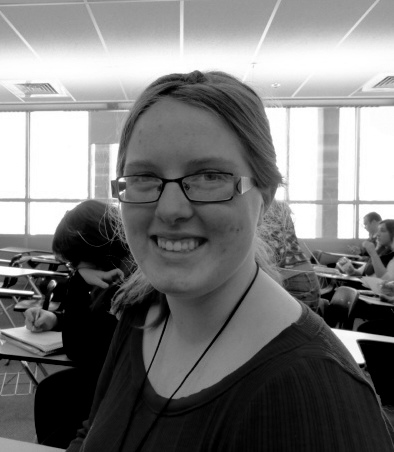A car made Band of Skulls famous.
The Southampton, England, blues-rock quartet were virtual unknowns when the fine folks at Ford Motor Company wisely chose to use their song “Light of the Morning” in an ad for the 2011 Mustang. The track leads off the band’s 2009 debut “Baby Darling Doll Face Honey,” which was largely praised by critics.
“Light of the Morning” defines that record—it’s a short, loud jam that leaves the listener wanting more. That want is satisfied, as 11 tracks follow it on “Baby.”
The much-anticipated sophomore album, “Sweet Sour,” takes the band’s sound in a different direction, but by no means fails to achieve what Band of Skulls are best at: enticing.
The lead, title track achieves this end most successfully. The opening riff is easily the sultriest and most seductive I’ve ever heard.
Frontman Russell Marsden’s guitar work and the vocal harmony between him and bassist Emma Richardson are hypnotizing, the song’s abrupt, single-chord ending, serving as the snap of the fingers releasing listeners from its spell.
The final four tracks are an equally beguiling group. “Navigate” and “Hometowns” are so despondent and depressing that a song like “Light of the Morning” is necessary to prevent anyone from contemplating suicide.
The band delivers with the penultimate track, “Lies,” an audacious return to the prevalent sound of Baby. The record’s title is even referenced in the lyrics: “How can you not have a little fun/Doll face honey?”
After “Lies,” the only fitting end to the record would be equally vigorous, right?
Wrong.
“Close to Nowhere” is the bleakest of all 10 songs on “Sweet Sour.” Minimalistic guitar work and a dark, chanting rhythm conjured by drummer Matt Hayward partner with almost nihilistic lyrics about not knowing one’s purpose in life to bring back the wave of gloom “Lies” was supposed to send away.
The track is a prime example of the record’s darker, more personal lyrics.
“Lay My Head Down” deals with a reluctant relinquishing of love, and “Bruises” has overtones addressing the adverse, outward effects of mental illness. The stripped down compositions on these more somber songs succeeds at letting their lyrical themes show through.
The album as a whole, as its title suggests, is a bit of a paradox. The loud, forceful sound of “Baby” is staunchly present on Sweet Sour—“The Devil Takes Care Of His Own” sounds like it could have been on an AC/DC record, and the driving drums and swift guitar and bass of “You’re Not Pretty But You Got It Goin’ On” are just plain fun to listen to.
After the first time around the album, the listener is left somewhat wanting.
This could be a result of the contrast of expectations created by “Baby,” or the desperate thirst for optimism after hearing “Close to Nowhere.”
But this aural teasing is what Band of Skulls are best at. After a few more listens ,the effect they create becomes clearer, and the record gets better and better, but there are still no definite answers. Even after hearing it a multitude of times, it is still packed with wonderful ambiguity.
“Sweet Sour” is like a great piece of literature—the first time through it’s apparent there’s an incredible amount of depth and substance, but it’s uncertain exactly what it is.
After examining it again and again, the meaning is still unclear, but that ambiguity allows for the open development of different interpretations.
With “Sweet Sour,” Band of Skulls have definitively proven that they should never be underestimated.
Weekly Comic: Feb. 23, 2012
Virginia legislature passes controversial laws about abortion
Virginia is passing some frightening abortion legislation.
The state’s House of Delegates recently passed one bill that would declare a fertilized egg at any stage of development a person under Virginia law. This means zygotes and embryos would be subject to the same rights and privileges as adults and other people.
Another bill would require women seeking an abortion to have an ultrasound test performed so they could see images of the fetus. Applying this stipulation to even the earliest, most proactive abortions (which the legislation does) would require a transvaginal ultrasound—a procedure in which a probe is inserted into the vagina to produce images of the reproductive organs that a traditional, external ultrasound wouldn’t be able to provide.
Both these measures are incredibly flawed and are extreme affronts to women.
The first is scientifically, logically and philosophically unsound. A fertilized egg in its earliest stages of development is certainly a living organism, but to qualify it is a person carries major implications.
An embryo is wholly dependent on its mother to survive. It subsists on everything she ingests—food, water, air and a number of other things. It is not biologically developed enough to live on its own.
This does not sound like a person to me.
I cannot think of a living human being who lacks the ability to eat, drink and breathe—to live—on his or her own. While people do depend on others, it is of their own conscious choice to do so. Embryos do not have that choice.
The ultrasound legislation is even more disturbing. Forcing a woman to view images of her own internal organs is a clear effort to influence her decision whether or not to have an abortion.
I personally feel that women are perfectly capable of making such a decision on their own. Legislation such as this implies that women lack the cognitive ability to do so and that it’s the government’s responsibility to do it for them.
Virginia’s lawmakers need to understand that women are not mentally incapable. This bill would make legal intensely loaded methods of coercion. Men aren’t required to go through counseling or view an ultrasound of their testicles before having a vasectomy.
I fail to see the necessity of government regulation of what women do with their own bodies when there is no question of those decisions by men. These sexist double standards imply that women are somehow intellectually inferior and that they should be given no faith or freedom.
Furthermore, the bill’s ultrasound requirement would arguably legalize rape.
A transvaginal ultrasound, which the bill would require if a traditional ultrasound couldn’t produce sufficient images, is a decidedly invasive procedure.
Under this legislation a woman seeking an abortion would be forced to have an object inserted into her vagina; an amendment to require the woman’s consent was even expressly rejected by the Virginia legislature.
According to the United States Department of Justice, this is rape. In January, the DOJ redefined rape as “The penetration, no matter how slight, of the vagina or anus with any body part or object, or oral penetration by a sex organ of another person, without the consent of the victim.”
The transvaginal ultrasound stipulation fits this definition to a T—it is nonconsensual penetration of the vagina.
I can understand the position of the bill’s advocates. They want to minimize the number of abortions that occur in their state, which is not a bad goal.
Raping women, however, is an improper, disgusting way to achieve that goal.
The most effective, practical and sensible way to do this would be the wide distribution of and easy access to contraceptives. Abortion is a way of dealing with an unplanned pregnancy, whether it be a result of rape, incest or unsafe sex. The government’s interest, then, should be to minimize unplanned pregnancy, which access to contraceptives succeeds in doing.
State-sanctioned rape and other deplorable affronts to women like those in Virginia do not do so.
Chartwells responds to hungry journalist
On Feb. 8, I wrote an editorial titled, “Early birds miss the worm: Lack of weekend breakfast leaves busy students hungry”. I was pleasantly surprised to see in my OWU e-mail inbox a message from Daniel Magee, director of Chartwells’ dining services, on Feb. 15.
I was not expecting such a timely response, let alone any response at all. In his e-mail, Magee said my editorial made him want to change the current dining situation on campus.
“Your argument was persuasive and clearly illustrated the plight of students on the weekends looking for early morning food options,” Magee said. “So, here is my idea. We will open Smith on Saturdays and Sundays from 9:00 a.m. to 10:30 a. m. for a light breakfast, which will include the following:
1. Cereals and Hot Oatmeal
2. Fresh cut fruit and whole fruit
3. Bagels, English Muffins, Pastries
4. Yogurt, Cottage Cheese”
Magee began starting the service on Feb. 18 and plans to run it until the end of the semester to gauge student response. Breakfast costs $5.50.
I am very impressed with Chartwells’ prompt response to my concern and their amply sufficient solution to it. You can definitely plan on seeing my face at Smith on Saturday and Sunday mornings—come join me for breakfast!
Fountain construction on the Jay: Learning to love the ‘62 alumni gift
Some students have objected to the new JAYWalk fountain because there was a lack of information and consultation; because it impedes the traffic flow; because it creates a safety risk; because it attracts mischief; because the money for it should have gone to higher-priority items; and because it wastes water when we should be saving and stretching our natural resources.
It’s great that OWU students feel a sense of ownership and care about the campus enough to engage in a passionate public debate.
An open discussion about the pros and cons of an issue can lead to an even better final product, as is the case here.
I think we can all agree by now that there were plenty of opportunities for people to weigh in, for example at the open WCSA forum that was held on Feb. 2.
As far as the traffic flow is concerned, I envision the fountain as a sort of roundabout. It may slow you down a tad, but essentially pedestrians and vehicles can move on quickly and efficiently without losing precious time.
Is the fountain a potential safety risk?
I overheard someone say that an intoxicated student might inadvertently stumble into the water and drown. I pay close attention to safety issues of all sorts, but in all my life I have never heard of a single case where someone fell into a shallow fountain and drowned.
If anything, the cold water will wake you up. You are more likely to drown in your own bathtub at home.
Yes, the new fountain is likely to attract some mischief until its novelty wears off. You won’t get any ideas for misbehavior from me, but occasionally the water may need to be replaced.
I am sure Public Safety will patrol the new fountain to ensure that it does not get abused or damaged.
By the way, if someone decides to dip their bare feet into the water on a hot summer day or if once in a while a dog jumps in to cool off, that does not constitute misbehavior in my book.
Water is supposed to be touched, experienced, and used and not merely admired from a distance. I hope PS will be reasonable in their interpretation of rules.
Could the money for the fountain have been used for more pressing issues? Perhaps. But do keep in mind that the expense for the fountain (under $100,000) does not come from your tuition money or from OWU’s operating budget. It is a generous gift from the Class of 1962 in celebration of their fiftieth anniversary.
Alumni prefer to fund tangible structures rather than invisible things such as underground pipes or student scholarships, and I cannot fault them for that.
Lastly, does the fountain waste too much water? In my opinion, it does not.
The circulating water is filtered and reused, and only a small amount is lost due to evaporation, spraying, or intentional splashing.
The new fountain will be beautiful and a welcome addition to OWU.
The final design (option G) blends vegetation and open water and provides plenty of seating opportunities on all four sides.
It looks fantastic. Once finished, it will quickly become the pulsating heart and center of Campus.
In Europe, where I grew up, fountains are ubiquitous and create popular gathering places for locals and visitors alike – a place where people casually congregate, sit, talk, read, or eat an ice cream cone.
There, fountains serve an important social function.
Water does have a magnetic effect on people because it resonates deeply with our innermost human nature. It also has calming, healing powers and provides a feeling of serenity and belonging. I am sure that once the fountain is completed students will accept and embrace it with heart and soul and wonder what life was like without it.
As far as I am concerned, I would like to see even more fountains on Campus – perhaps a smaller one outside the President’s office in University Hall or in front of Slocum?
Strand prices change, but the tradition still remains
The Strand Theater has provided the cinematic experience for locals and students for many years. The theater also has had close ties to Ohio Wesleyan since 2002.
“In 2002, Ohio Wesleyan took over ownership of the theater,” said manager Kara Long. “Then in November of 2008, they formed a separate non-profit group called The Strand Theater and Cultural Arts Association. It’s a fifteen member board of directors. Now we have the ability to fundraise on our own and get grants to keep the building up.”
Prior to OWU taking over The Strand, “(Business) was very slow,” Long said. “I changed film buyers when I took over in 2002. We were not getting our fair share of movies. The previous owner’s film buyer was not fighting. So, I found one that would say, ‘That’s not fair, we have every right to make money as anyone else in town.’”
The Strand Theater and OWU still maintain a close relationship.
“Of the fifteen board members, Ohio Wesleyan appoint eight, so they kind of retain a little bit of control,” Long said. “It was a good thing, if anything would go wrong – if the wheels would come off the bus, as they say – they could pull it back under. It’s a kind of safe guard.”
Upon returning to campus last semester, students noticed the change in price at The Strand. Previously, with an OWU ID, students could get in to see a movie at any time for four dollars. On August 1, that price went up to five.
“The studios have limits on us, called per capita, where they set in their minds, in Hollywood or New York, how many tickets at what price you should sell,” Long said. “We had way too many coming in at four dollars. The high school students were already five dollars, so it was the logical step. It made the studios get off our back. It’s the last thing you want to have, the studio on your back, looking at your prices. They can’t tell you what to charge, but they can make life difficult.”
Taylor Clark, 18, has been employed at The Strand since 2008.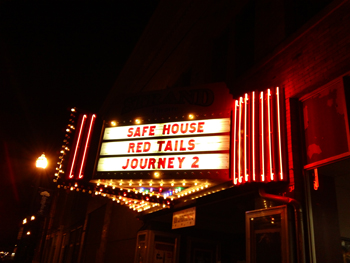
“My mom and my grandma also worked here,” Clark said. “It wasn’t planned that I work here, it just happened. It was just irony.”
Clark said she loves working at The Strand.
“Working in a historical building (is the best part),” Clark said. “You learn a lot about film, which not many people know much about. This is like a Delaware classic thing, so it’s nice to know the insides of it.”
Clark said if she had to choose between seeing a movie at The Strand or a bigger theater like the Rave in Columbus, she would choose The Strand.
“Much cheaper, and it’s homey,” Clark said.
Sophomore Lauren Foote said she would rather see a movie at The Rave.
“If it didn’t count on price?” Foote said. “The Rave. Just because it is a lot bigger, and a lot more options. I can watch 3-D movies or movies The Strand doesn’t have.”
Foote also spoke about the advantages of the historical theater.
“It’s affordable, it’s on a very close street to campus, so if I want to go see a movie I can drive and it take six seconds or I can walk with friends,” Foote said. “It shows recent movies, it’s not like narrow indie films. They show movies that are actually out. And they have good popcorn.”
However, Foote said, there were a few draw backs to the Strand.
“It could be a little bit bigger,” Foote said. “They only have three rooms, and the seats are a little outdated. A little bit of refurnishing would be helpful. Otherwise, (I don’t have) many complaints about The Strand.”
Long assists the film buyer in choosing which films to show.
“Her and I consult every Monday on what’s coming and going,” Long said. “Sometimes I know like on March 2 we’re going to get Project X and The Lorax, but I don’t know what the third picture will be.
“Next week, I know we’ll be picking up The Artist for next Friday, I don’t know what the other two films will be. This time of year, we just go to boxofficemojo.com, and let’s say I have requests, so we pull them in… This time of year is when we get the chance to pull in the Oscar stuff. Once we get past the first weekend of May, then the gloves come off and we start first run.” Long said
The Strand Theater is located on Winter Street, and students can find show times, upcoming movies and events at their website: http://www.thestrandtheatre.net.
New food court to feature low cost changes
The Hamilton-Williams food court is long overdue for a face-lift. Neither furniture nor equipment has been replaced since the campus center was built 20 years ago.
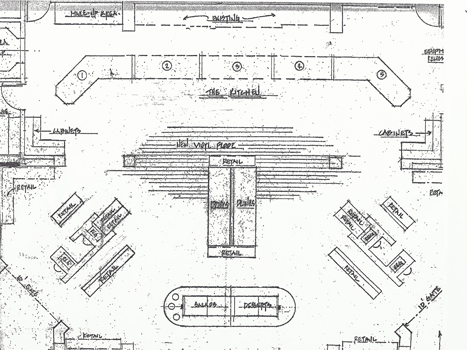
The renovated food court will serve much of the same food, keeping the sushi, sandwich, Healthy Bishop and salad stations. But it will also bring change, incorporating more brand-name food.
This would allow for more variety and convenience. A Papa John’s pizza station will allow students to quickly grab individual-sized pizzas. Chartwells is also deciding between two local brands to replace the current grill station.
The school has been reluctant to involve brand-name products in the past because most companies demand commissions. So far, Starbucks and Coca-Cola are the only brand-names on campus.
The food court’s layout will change as well. The same architect who planned Smith Dining Hall drafted the new floor plan.
The renovations aim to increase efficiency, angling the cash registers so students can flow through more easily. These changes also affect the dining areas, which will look different without losing seating.
Castelli said the renovation would cost $500,000 – $600,000, a modest budget compared to recent projects.
“Considering the school spent $13 million on Stuyvesant, this amount doesn’t seem like much,” Castelli said.
This project would cost less than previous dining hall renovations. Smith Dining Hall was given $1 million for its renovation in 2007.
Senior Eric Charette said he remembers how Smith Dining Hall looked before the changes.
“I had dinner in Smith as a prospective student, and it was disgusting then,” Charette said. “When I came back in the fall, I recognized the renovations immediately because it was so starkly different.”
In fact, a survey conducted soon after the renovations showed a 41 percent increase in student satisfaction of Smith Dining Hall.
The food court renovation is only one of Chartwells’ proposed campus changes. Castelli also mentioned the Thomson Convenience Store might be remodeled within a few years, although current students should not expect to see these changes soon.
Sophomore Ariel Koiman has worked extensively with Chartwells as a WSCA Representative.
He said he is looking forward to the renovations, and thanked Chartwells.
“I think it’s an excellent idea” Koiman said. “They’re doing the renovations for us. Honestly, I don’t know how they make a profit.”
Sound-Off OWU: What were your reactions to Mock Convention?
Weekly Public Safety Reports: Feb 16-20, 2012
Feb. 16 8:50 a.m. – Public Safety and Delaware City Police officers were dispatched to 23 and 35 Williams Drive on a report of vandalism. Several pieces of furniture in the common areas of each residence had been turned over, and a television was destroyed at the 23 Williams address. Investigation is ongoing.
Feb. 16 5 p.m. – an OWU student reported an alleged sexual assault at an off campus location on February 11. The case remains under investigation.
Feb. 17 7:30 p.m. – damage to a vehicle in the Smith Hall parking lot was reported.
Feb. 17 10:30 p.m. – an OWU student was attacked by a dog in the vicinity of 31 South Washington Street and suffered bite wounds to the lower leg. The student was treated and later released from Grady Hospital ER. A report was filed with the Delaware City Police Department.
Feb. 17 8:35 a.m. – OWU Housekeeping staff recovered a wallet and turned it in to Public Safety. The owner of the wallet reported that cash was missing from the wallet.
Feb. 18 2:40 a.m. – Public Safety and Delaware EMS personnel were dispatched to Hayes Hall on a report of an unconscious person. Upon the arrival, the student was conscious and coherent. The student refused treatment.
Feb. 19 1:30 a.m. – Public Safety officers were dispatched to Welch Hall on a noise complaint.
Feb. 19 5:45 p.m. – Public Safety dispatched to the JAYwalk on a report of a suspicious person. A search of the area failed to locate the individual, described as a white middle-aged male of medium height and slim build.
Feb. 19 11:48 p.m. – a Bashford Hall resident was referred to student conduct for drug, alcohol and criminal damage offenses. Delaware City Police also issued citations for drug abuse and paraphernalia.
Feb. 20 1:33 a.m. – a local resident was arrested and charged with trespassing after Public Safety and Delaware City Police officers were dispatched to the Beeghly Library on a security alarm activation.
Sexuality and marriage: Is there a right answer?
A sexuality, marriage and homosexuality debate was held last Wednesday to address the intersection between gay marriage and the church.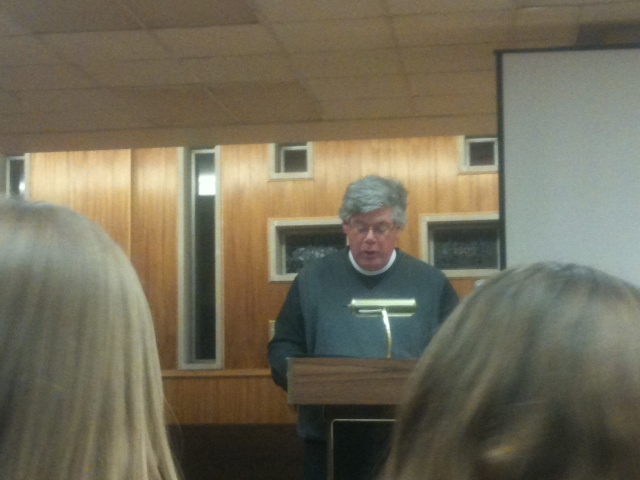
The lecture was introduced by Emmanuel Twesigye, Aden S. and Wollam Benedicts professor of Christian studies, who began with the topic of polygamy in African cultures. Twesigye talked about the benefits of polygamy and how it is a symbol of power and wealth as well as “(a) system of community” within the family.
He also talked about homosexuality in Africa, and how the cultures there are against it. He focused on his home country of Uganda, where homosexuality is illegal.
Twesigye said that in the past, “(a) man who got caught in the act would be put to death,” but now, the laws are being modified to punish homosexual acts by long imprisonments.
Twesigye connected both the controversial topics of polygamy and gay marriage. While homosexuality is condemned in most African countries, strong support for gay marriage can be found in the United States.
On the other hand, polygamy in African nations such as Uganda is highly valued, yet shunned here in America.
Twesigye continued by saying, “maybe you should let us have many wives, and we’ll let you have homosexuality.”
The next presenter was Reverend Charles Wilson, the director of St. Peter’s Episcopal Church in Delaware. He said, “next to abortion, the issue of homosexuality is one of the greatest of our time.”
Wilson believes people have developed negative views of homosexuality from religious text. He provided an example of homosexuality in the Bible from Leviticus 18:22, which says, “You should not lie with a male as with a woman.”
Wilson argues the concept of homosexuality as we understand it now was not present when the Bible was written.
He talked about Biblical teachings of sex, and how God encouraged men and women to reproduce. He recited from Genesis, where God says, “Be fruitful, multiply.” Wilson argued this passage portrays sex as natural and as a gift from God in order for humans to reproduce.
One of the main reasons homosexuality was condemned in the church, Wilson believes, is because it discontinues reproduction.
“We agree that heterosexuality is preferred for the reason of procreation,” Wilson said.
He believes that “cultural norms created by the power of the state and religion” have established the idea that sex should be used for the production of children.
Wilson pointed out, “children have always been the main reason for having sex.” He added that historically, children were the ones who would provide for parents when they reached old age.
Because homosexual sex is non-reproductive, Wilson said gays are viewed as “doing something opposite of God.Gays have been demonized,” and the gay community has been “used as a boogeyman” and “monster” to scare children into being “manly.”
He believes that sex is viewed differently today. Wilson used the media as an example. He talked about Beckham’s underwear ads and the Modern Family actress, Sofia Vergara, who has been titled “sexiest woman,” in order to address the way sex is encouraged and used to sell in our culture.
Wilson talked about an “evolution of sex,” which “allows us to view non-reproductive sex in a less negative light.”
He later went on to talk about marriage as an establishment. Wilson said people get married because “we human beings do is organize things.”
In terms of same-sex marriage, Wilson believes gays should have access to the same rights, and “they should allow same sex marriage across the board.” Junior Victoria Wehner was pleased with Wilson’s discussion. “I liked how he mentioned that humans are organizational,” she said. “He brought up some really good points.”
As a member of the LGBTIQ community, freshman Ryan Haddad was happy to see a religious figure in a position of support for gay marriage. “Seeing religious figures that say it’s alright to be who you are is very important,” said Haddad.“(It) gives us comfort and is empowering,” he added. Haddad believes it demonstrates that “not everyone will exclude us.”
